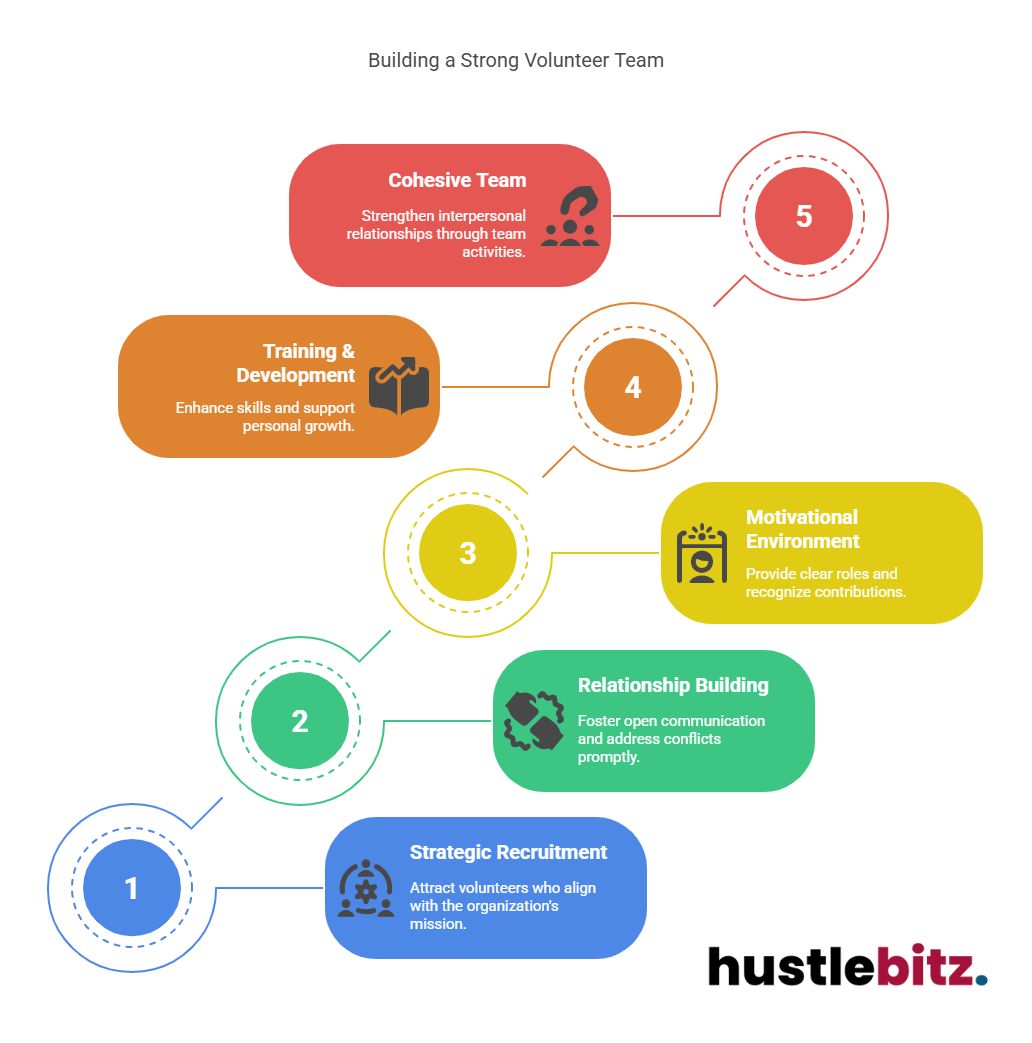To foster motivation in volunteer work and nonprofits, it is crucial to engage volunteers effectively through strategic recruitment and clear communication of their impact. Building strong relationships through open dialogue and feedback nurtures a collaborative atmosphere. Creating a motivational environment involves setting achievable goals and recognizing contributions through appreciation programs and personalized recognition. Additionally, offering training and development opportunities enhances skill sets while promoting personal growth. Finally, establishing a sense of community and belonging encourages long-term commitment and satisfaction. These foundational elements can transform volunteer engagement, leading to greater organizational success and a more motivated volunteer base.
Key Takeaways
- Engage volunteers through strategic recruitment and effective onboarding to align personal values with the organization’s mission.
- Foster strong relationships by maintaining open communication and addressing conflicts promptly to create a collaborative atmosphere.
- Create a motivational environment by providing clear roles, setting achievable goals, and recognizing volunteer contributions through appreciation programs.
- Offer training and development opportunities that enhance skills and support volunteers’ personal and professional growth.
- Build a cohesive team through team-building activities that strengthen interpersonal relationships and promote a supportive atmosphere.

Engaging Volunteers Effectively
Engaging volunteers effectively requires a strategic approach that fosters a sense of belonging and purpose within the organization. Central to this process are well-defined volunteer recruitment strategies that attract individuals aligned with the organization’s mission. Effective communication techniques play a pivotal role in conveying the value of volunteering, ensuring potential volunteers understand the impact of their contributions.
A comprehensive volunteer onboarding process is essential to integrate new volunteers seamlessly into the organization. This includes tailored volunteer roles that match individual skills and interests, thereby enhancing team dynamics and volunteer satisfaction. Leveraging social media can significantly broaden outreach efforts, providing platforms for sharing success stories and encouraging community engagement.
Creating flexible schedules allows volunteers to balance their commitments, which is crucial for maintaining motivation and participation. Additionally, promoting diversity inclusion ensures a broader range of perspectives and experiences, enriching the organization’s culture and effectiveness.
Measuring volunteer satisfaction through targeted feedback mechanisms can provide valuable insights into the volunteer experience, enabling organizations to make informed adjustments. By actively seeking and acting on volunteer feedback, organizations can cultivate a supportive environment that recognizes and addresses the needs of their volunteers.
Building Stronger Volunteer Relationships
Strengthening relationships with volunteers is essential for fostering a supportive and motivated environment within nonprofit organizations. Effective relationship building begins with open lines of communication, allowing volunteers to provide valuable feedback on their experiences. This feedback not only informs organizational practices but also enhances trust development between staff and volunteers, creating a culture of transparency.
Implementing tailored communication strategies can further enhance these relationships. Regular check-ins, newsletters, or informal gatherings can keep volunteers informed and engaged, while also offering opportunities for team bonding. Building social connections among volunteers through engagement activities fosters a sense of belonging, which is crucial for motivation.
Conflict resolution is another vital aspect of maintaining strong volunteer relationships. Addressing issues promptly and constructively helps prevent misunderstandings from escalating, reinforcing the commitment to shared goals. By encouraging a collaborative atmosphere, organizations can ensure that volunteers feel valued and understood.
Mentorship programs can also play a significant role in relationship building. Pairing experienced volunteers with newcomers fosters knowledge transfer and strengthens community ties. Furthermore, these programs promote personal and professional growth, benefiting both the organization and its volunteers.
Creating a Motivational Environment

A motivational environment is essential for maximizing volunteer satisfaction and effectiveness, as it fosters a sense of purpose and belonging among individuals dedicated to the organization’s mission.
To create such an environment, organizations must prioritize motivational leadership, which inspires volunteers through vision and engagement. Leaders should employ positive reinforcement techniques to acknowledge volunteers’ efforts and accomplishments, thereby enhancing their intrinsic motivation.
Clear communication is vital in ensuring that all volunteers understand their roles and the organization’s objectives. Establishing feedback mechanisms allows volunteers to voice their thoughts and experiences, promoting transparency and continuous improvement.
Additionally, goal setting is crucial; setting achievable and meaningful goals can provide volunteers with direction and a sense of accomplishment.
An inclusive culture that values diverse perspectives encourages team collaboration, making volunteers feel valued and respected. This inclusivity should also extend to personal growth opportunities, where volunteers are empowered to pursue their interests and develop new skills.
Autonomy support plays a significant role in this process; allowing volunteers to make decisions about their work fosters ownership and increases motivation.
Lastly, providing emotional support through understanding and empathy reinforces the commitment to volunteer well-being.
Foster a Sense of Community

Building on the foundation of a motivational environment, fostering a sense of community among volunteers significantly enhances their connection to the organization and each other. Community building creates strong social connections that not only promote team bonding but also nurture an inclusive culture where shared values are celebrated. When volunteers feel a sense of belonging, they are more likely to engage actively and contribute meaningfully.
Creating opportunities for peer support is integral to fostering this community spirit. Volunteer-led networking opportunities and collaborative projects encourage participants to share experiences and knowledge, ultimately leading to enriched perspectives and stronger relationships. The integration of feedback loops allows for continuous improvement, ensuring that volunteers feel heard and valued in their contributions.
Below is a table illustrating the impact of community building on volunteer motivation:
| Community Building Activities | Benefits |
| Team-building exercises | Enhanced team bonding |
| Social gatherings | Strengthened social connections |
| Recognition events | Increased volunteer appreciation |
Recognize and Reward Contributions

Recognizing and rewarding contributions is essential for enhancing volunteer motivation and fostering long-term engagement within the organization. Implementing effective appreciation programs can significantly boost the morale of volunteers, making them feel valued and integral to the organization’s mission.
Volunteer recognition can take many forms, including personalized thank yous, public acknowledgment during meetings, and social media shoutouts that celebrate individual and team achievements.
Incorporating feedback mechanisms can also enhance recognition efforts, allowing volunteers to share their experiences and suggestions. This two-way communication fosters an environment of mutual respect and appreciation.
Additionally, establishing incentive strategies such as awards ceremonies or milestone celebrations can effectively highlight collaborative achievements and motivate volunteers to strive for excellence.
Celebrating milestones not only honors individual contributions but also reinforces a sense of community among volunteers. These events provide opportunities for networking and relationship-building, further solidifying their commitment to the organization.
Furthermore, acknowledging efforts through tangible rewards can create a culture of appreciation that resonates throughout the nonprofit.
Ultimately, recognizing and rewarding contributions is not merely an act of gratitude; it is an investment in the future of the organization. By cultivating a culture of recognition, nonprofits can ensure that volunteers remain engaged, motivated, and committed to their mission, resulting in a more dynamic and effective organization.
Offer Training and Development

Providing training and development opportunities is crucial for enhancing volunteer skills and increasing their overall engagement within the organization. By investing in skill enhancement, nonprofits can cultivate a more competent and motivated volunteer base. Leadership workshops are an effective way to prepare volunteers for roles that require initiative and decision-making, promoting a sense of ownership in their contributions.
Mentorship programs can serve as a valuable resource for volunteers seeking guidance and support. Pairing experienced individuals with newcomers fosters personal growth and builds a cohesive team environment. Additionally, regular feedback sessions allow volunteers to reflect on their experiences, identify areas for improvement, and feel valued for their input.
Career coaching can also play a significant role in volunteer development. Providing access to online courses tailored to various skill sets empowers volunteers to advance their expertise while furthering the mission of the organization. This not only benefits the individual but also enhances the organization’s capacity to achieve its goals.
Furthermore, incorporating team building activities can improve collaboration and conflict resolution skills among volunteers. These experiences not only strengthen interpersonal relationships but also create a supportive atmosphere that encourages open communication.
Final Thoughts
Fostering motivation in volunteer work and nonprofits requires a multifaceted approach that focuses on engagement, relationship building, and creating a supportive environment. By strategically recruiting and onboarding volunteers, organizations can align individual values with their mission, enhancing motivation and satisfaction. Building strong relationships through open communication and addressing conflicts promptly fosters a collaborative atmosphere where volunteers feel valued. Recognizing and rewarding contributions, offering training and development opportunities, and fostering a sense of community further support long-term commitment and effectiveness. By integrating these practices, nonprofits can cultivate a motivated and dedicated volunteer base, leading to greater organizational success and impact.




